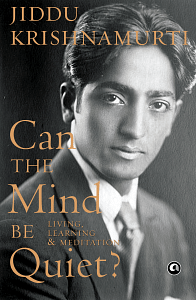She was married to a very rich man and was staying at the Ritz. She was what you might call a sophisticated person, educated, Catholic. She had done a lot of social work, had probably read a great many books, was quite intelligent, in the normal sense of that word, and quite serious. It is strange how such an intelligent mind with a clear-cut formula or a definite method could try to realise something that can never be approached through the intellectual or emotional way of life. This phenomenon exists all over the world. They are very serious people who have worked hard, who have probably given up certain things for the good of society. They work tirelessly, carried on by their own interest and the realisation that something has to be done. They are absolutely convinced that you must have a method, as you have a method in business, in a political campaign, in a well-organised religious framework, or when you do something in the social world.
All these have definite formulas laid down on well-known principles, clear, definite and purposive. In all these there is a direction, a positive assertion and clarification. They move always from the known to the known, feeling secure at each step, knowing where they are going, positive in their activity and in their goal. After all, education is the cultivation of the known into the known, moving from fact to fact, never deviating, never questioning fundamentally. They are not materialistic, though they may be very rich. They have a suspicion of something more than physical wellbeing and are not entirely slaves to environment. They have worked hard, they have fought hard and their outlook is hard too.
You meet such people all over the world, not only well-cultured individuals, but who are alive to the disasters that are going on, to the mess the politicians are making through their personal vanity or for the importance of their party. They are also aware of the great disturbance that is going on within the pattern of religious organisations and the general havoc that war and the narrow spirit breed. They are highly intellectual or devastatingly emotional but moving in the same direction: the reformation of the world and vague aspirations of a spiritual life.
It is the positive approach to life. It is a mind that must see everything very clearly as it goes along to the very end. The end must be as clear, definite and precise as the beginning. And in this positive clarity, discipline becomes a subtle form of conformity, which denies freedom. Yet they feel this very positive approach offers freedom. This approach is really materialistic—their gods, their utopias, social reform and activities are for good; goodness that must be known, virtue that must be practised. Evolution is the final movement of life; the everlasting becoming better and better and better. This positive approach, which promises so much, is fundamentally the most destructive, for in it there is no freedom at all, neither at the beginning nor at the end.
The total negation of all this is one of the most difficult things to comprehend. Denying all systems and methods that promise freedom, is freedom. The emptying the mind of the positive, which is the formula, the ideal, the pursuit of the utopia, is the most positive action, in which alone a fundamental revolution can take place. The beauty of this is not immediately perceptible. What is immediately perceptible for a positive mind are the rungs of the ladder, and when there is no ladder to climb it gets lost. The fear of losing a grip on the ladder sustains inventing new ladders. You hear this on every occasion, among the Hindus, the Catholics and the communists.
They start from a central thesis or a belief and weave their cloth round it, and that very cloth blinds them. There is really no division between the positive and the negative. It is not going from this to that but awareness of the implications of the positive that inevitably brings the other about; the total perception of the so-called positive, in which is included systems, methods, self-improvement, the gradual process of achievement, the movement from the known to the known. Total perception of the so-called positive is the total negation of all that, and this negation has its own radical movement.
 This excerpt from Jiddu Krishnamurti’s ‘Can the Mind be Quiet?’ has been published with permission from Aleph Book Company.
This excerpt from Jiddu Krishnamurti’s ‘Can the Mind be Quiet?’ has been published with permission from Aleph Book Company.



